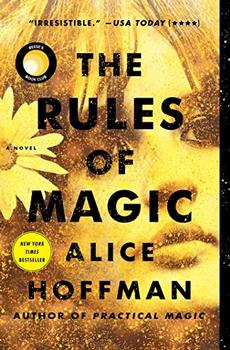Summary | Excerpt | Reading Guide | Reviews | Beyond the Book | Readalikes | Genres & Themes | Author Bio

Excerpt
The Rules of Magic
Once upon a time, before the whole world changed, it was possible to run away from home, disguise who you were, and fit into polite society. The children's mother had done exactly that. Susanna was one of the Boston Owenses, a family so old that the General Society of Mayflower Descendants and the Daughters of the American Revolution were unable to deny them admission to their exclusive organizations, despite the fact that they would have liked to close the door to them, locking it twice. Their original ancestor, Maria Owens, who had arrived in America in 1680, remained a mystery, even to her own family. No one knew who had fathered her child or could fathom how she came to build such a fine house when she was a woman alone with no apparent means of support. The lineage of those who followed Maria was equally dubious. Husbands disappeared without a trace. Daughters begat daughters. Children ran off and were never seen again.
In every generation there were those who fled Massachusetts, and Susanna Owens had done so. She had escaped to Paris as a young woman, then had married and settled in New York, denying her children any knowledge of their heritage for their own good, which left them with nagging suspicions about who they were. It was clear from the start that they were not like other children, therefore Susanna felt she had no choice but to set down rules. No walking in the moonlight, no Ouija boards, no candles, no red shoes, no wearing black, no going shoeless, no amulets, no night-blooming flowers, no reading novels about magic, no cats, no crows, and no venturing below Fourteenth Street. Yet no matter how Susanna tried to enforce these rules, the children continued to thwart her. They insisted upon being unusual. Eldest was Frances, with skin as pale as milk and blood-red hair, who early on had the ability to commune with birds, who flocked to her window as if called when she was still in her crib. Then came Bridget, called Jet due to her inky black tresses, a girl as shy as she was beautiful, who seemed to know what others were thinking. Last there was Vincent, the adored youngest child, a surprise in every way, the first and only boy to be born into the family, a gifted musician who whistled before he could talk, so charismatic and fearless his worried mother took to keeping him on a leash when he was a toddler, to prevent him from making an escape.
The children grew up quickly in the last years of the 1950s, their odd behavior increasing with time. They had no desire to play games and no interest in other children at the park. They sneaked out the windows of the family's shabby town house on Eighty-Ninth Street on the Upper East Side after their parents went to bed, cavorting on the roof, scurrying down fire escapes, and, as time went on, wandering into Central Park at all hours. They wrote with black ink on the living room walls, read each other's thoughts, and hid in the basement scullery, where their mother could never find them. As if it were their duty, they broke the rules one by one. Franny wore black and grew night-blooming jasmine on her windowsill, Jet read every novel written by E. Nesbit and fed stray cats in the alley, and Vincent began to venture downtown by the time he turned ten.
All three had the gray eyes the family was known for, but the sisters were opposites in every way. Frances was sulky and suspicious, while Jet was kindhearted and so sensitive that a negative remark could make her break into hives. Jet was fashionable, following in her mother's stylish footsteps, but Frances was usually rumpled, her hair left uncombed.
She was happiest when her boots were muddy as she navigated the park, wandering through Sheep Meadow. Her gift with wild birds allowed her to bring them to her merely by lifting her hand. From a distance, when she ran so fast she was nearly flying, it seemed as if she spoke their language, and was meant for their world more than her own.
Excerpted from The Rules of Magic by Alice Hoffman. Copyright © 2017 by Alice Hoffman. Excerpted by permission of Simon & Schuster. All rights reserved. No part of this excerpt may be reproduced or reprinted without permission in writing from the publisher.
Your guide toexceptional books
BookBrowse seeks out and recommends the best in contemporary fiction and nonfiction—books that not only engage and entertain but also deepen our understanding of ourselves and the world around us.